Stories published September 1998
reviewed by Mark R. Kelly
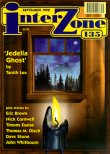 Interzone September 1998
Interzone September 1998
(issue profile)
Tanith Lee, ''Jedella Ghost''
A strange young woman wanders into town, claiming to be 65 though looking only 18, having no understanding of ideas about sickness, aging, or death. A writer intrigued by her case sets out to find where she came from, and uncovers an extraordinary experiment in artificial conditioning. Another story by Lee atypically SF, not fantasy.
Timons Esaias, ''The Mars Convention''
Humans are extinct, but aliens have found 100 or so works of ''science fiction'' and hold a conference to debate their meaning. How can all those depictions of Mars be consistent? What is the moral priority of Leibowitz? An auditor is forced to conclude that the sacred canon can't be consistent -- they're just stories! Esaias affectionately parodies SF cliches while considering the archaeological, extra-literary value of something known to be untrue.
(Sun 18 Oct 98)
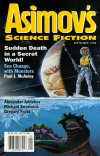 Asimov's September 1998
Asimov's September 1998
(issue profile)
Paul J. McAuley, ''Sea Change, with Monsters''
During the Quiet War with Earth, Europa's sub-ice ocean was infested with various biowar macrofrom 'monsters'. Now Indira, a monster-killer, travels to a remote monastery of Adamists who have reported sighting one of the largest monsters, a dragon. Despite the Adamists who resent her presence Indira discovers a mystery out of some gothic saga among the underwater weed farms. Complex and dense, not a 'fast read' but engrossing true-blue hard SF.
Michael Swanwick, ''Radiant Doors''
Time portals have deposited tens of millions of refugees, mostly victims of atrocities, from the future into the present. Linda, a worker in a refugee camp, wonders if time is deterministic or if there is a way to prevent the atrocities. Then she comes into possession of a future device to control peoples' wills, and understands some of the answers. A sharp time paradox story that speculates on the future of human society and the origin of evil.
(Sun 18 Oct 98)
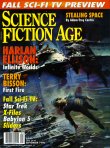 Science Fiction Age September 1998
Science Fiction Age September 1998
(issue profile)
Robert Reed, ''The Cuckoo's Boys''
A scientist, Philip Stevens, has propogated his DNA via airborne microbes and created a generation of PS clones. Now three PS boys -- with markedly different personalities -- are challenged by their science mentor to imagine building a starship and exploring a new world. When anti-PS protestors threaten the boys, the mentor takes action to protect them. Reed takes as his starting point a familiar worst-case scenario from recent debates about cloning: what if a mad scientist creates an army of duplicates of himself? In this intelligent tale Reed not only exposes the fallacy that clones would be identical zombies, but considers what might motivate a scientist to do such a thing in the first place.
Terry Bisson, ''First Fire''
First, a neat idea: an invention that dates the moment of ignition of any burning flame. Its inventor brings it to a tycoon funding an archaeological expedition at a site where monks have supposedly kept a flame burning for thousands of years. Second, human motivation. Why does the tycoon care? Bisson pits human ambition and arrogance against an anthropic universe, and culminates in a sense-of-wonder climax that alludes to one of SF's best known stories.
David Langford, ''Out of Space, Out of Time''
A physicist at Miskatonic University, his tale of Cthulhu dreams only partially told by H. P. Lovecraft, tells the rest. His efforts to visualize the fourth dimension lead to contact with a character out of Lovecraft and an enhanced reputation as an iconoclastic physicist. Langford cleverly and disturbingly shows how well Lovecraft's mythos corresponds to the real horrors of the 20th century.
(Fri 24 Sep 98)
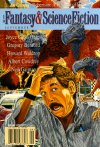 F&SF September 1998
F&SF September 1998
(issue profile)
R. Garcia y Robertson, ''A Princess of Helium''
This story is set against the same interstellar background as the author's ''Starfall'' in Asimov's a couple months ago, in which humans share the galaxy with SuperChimps, Neanderthals, and a race of symbiont Bugs. On the colony world Ariel a cloned airship captain, Llenor, brings her ship to port, meets a dashing security captain, and worships at the shrine of Elvis. A mission to bring together two Bug queens for a rare mating is disrupted by an explosion that lands Llenor in jail charged with murder. Dense and colorful yet fast-paced, this story shows that its author, best known till recently for historical fantasies, is just as adept at high-spirited SF adventure.
Albert E. Cowdrey, ''The Great Ancestor''
The black sheep son of a prominent New Orleans family decides to investigate the obscure history of its founder, Pierre Carcassone. The pursuit takes the historian through old gravesites and into city records that reveal how much Pierre was hated by his contemporaries. When the historian finds out why, it changes his life. The surprise is a familiar fantasy gimmick, but the journey through secrets of a family past is engrossing.
Joyce Carol Oates, ''Feral''
After Derek, a 6-year-old boy, almost drowns in a community pool, he becomes increasingly subdued, antisocial, and uncontrollable. His mother feels gnawing guilt -- if only she hadn't looked away from Derek in the pool for those couple moments. The inevitability of Derek's fate is compelling if clinical; Derek's loss of humanity mirrors his mother's loss of parental control.
(Fri 24 Sep 98)

|
Amazing Stories Summer 1998
(issue profile)
Ben Bova, ''The Mark of Zorro''
Bova's recurring character Sam Gunn, entrepeneur and scoundrel, features in a true-blue hard SF tale. Gunn is reduced to supervising maintenance of satellites and orbital telescopes, yet somehow he's making a killing on the commodities market. An investigator from Luna can't figure out how -- it's as if Gunn is receiving light-speed signals from prospectors elsewhere in the solar system before anyone else. The solution is a clever bit of technical finessing.
Orson Scott Card, ''Gooses''
An excerpt from Card's latest Alvin Maker novel, Heartfire, in which Alvin and his friends meet bird-painter Jean-Jacques Audubon in Philadelphia. Alvin's young ward Arthur Stuart is able to charm birds into standing still and convinces Audubon not to kill his subjects in order to paint them. The character exchange is spirited, though the excerpt doesn't really stand as a story on its own terms.
(Tue 15 Sep 98)
|
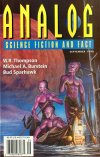 Analog September 1998
Analog September 1998
(issue profile)
Charles L. Harness, ''The Downsizing of Dr. Jain''
A chemist hits upon a method of biodegrading plastic using a sample of his own blood, the day before he's forced into early retirement.
Harness is equally effective describing the technical details of the experiment and in capturing the delicious revenge Jain exacts against the corporate tycoons who fire him and then have the gall to appeal to his sense of company loyalty.
Michael Burstein, ''Absent Friends''
In last year's ''Broken Symmetries'' two high school teacher pals, Jack and Daniel, discover a gate to a parallel universe. Two years later Jack, still pining over the death of his friend, tricks his way through the gate in a search for a parallel version of Daniel in the other universe. The story appeals to the familiar -- as in a scene out of Star Trek IV -- while seeming blithely innocent of the peculiar subtext of Jack and Daniel's relationship.
(Tue 15 Sep 98)


 Interzone September 1998
Interzone September 1998 Asimov's September 1998
Asimov's September 1998 Science Fiction Age September 1998
Science Fiction Age September 1998 F&SF September 1998
F&SF September 1998
 Analog September 1998
Analog September 1998